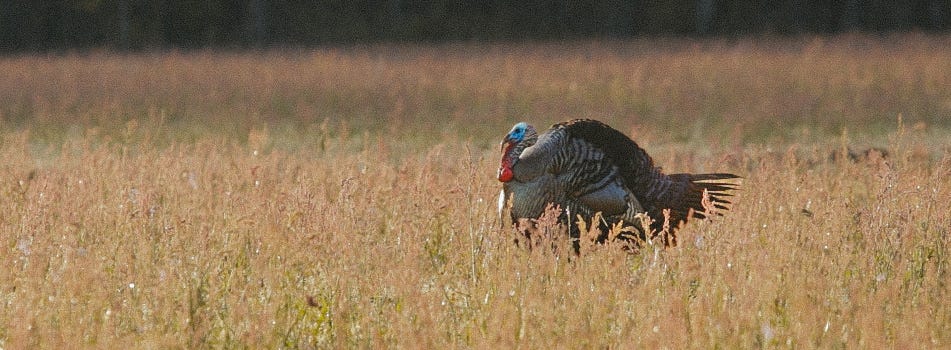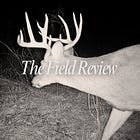I recently read Lost and Found in a Fly Shop by Alex Wilder about the secret language understood only by fly fishermen. If you haven’t read it, I’d recommend checking it out below.
Alex’s article got me thinking about the language of the outdoors, one that I’m still learning.
I didn’t grow up in this world. I didn’t inherit this language or these skills from anyone. I found my way here as an adult, through trial and error, good books, YouTube, bad mistakes, and a few generous friends who took the time to explain things along the way.
By and large, I taught myself everything I know from turkey calling to fly tying.
This coming spring will mark my fifth season as a hunter. Most people I know hit their fifth season before they could even drive themselves to the stand. I was 24 years old when I first picked up a shotgun that had something other than target loads in it.
Five years in, I’ve learned more than I ever thought there was to learn.
I can help put logic behind a decoy spread. I can pick out the seams where trout *should* be, and I can piece together enough sign to take a decent guess at where a buck might be bedded on a frosty fall morning.
But despite everything I’ve learned, there are still plenty of days when I hesitate before chiming into the conversation at the fly shop or the public land pull-off.
I think this is because I know that speaking the language isn’t the same as knowing what the words mean.
Watching vs. Living
One unique aspect about my journey into hunting and fishing is that, while I’ve learned through experience, I’ve learned more through observation via viewfinder.
A few weeks after starting my first job in the outdoor industry, I found myself standing in a swamp in central Florida, watching an Osceola turkey hunt unfold through the lens of a camera. A month later, I was in South Carolina, doing the same thing.
For two years, I worked primarily in ‘hook and bullet’ marketing. I traveled the country, sitting outside the blind on some of the best hunts I’ve ever been a part of to this day. I watched clients drop longbeards at 20 yards, limit out in Arkansas timber, and pole skinny water for redfish on the fly.
I stood there, directing the shots, making sure the footage was clean, the photos sharp, and the logos were in focus.
I was part of the hunt, but I wasn’t in the hunt. I was learning the language, but through a translator.
I can tell you what a wild turkey looks like strutting in perfect morning light. I can tell you exactly what angle a mallard should be banking to make for the best slow-motion shot. I can break down a fishing sequence so it tells a clean, satisfying story. But I wasn’t the one behind the gun, behind the bow, or behind the rod.
I wasn’t the one making the decisions, calling the shots, or feeling that rush of uncertainty just before pulling the trigger or releasing the cast.
And maybe that’s why, five years in, I still feel like there are things I don’t fully understand. Not because I haven’t seen them, but because I haven’t lived them myself.
The Words I Haven’t Earned
I’m not afraid to tell you that while I’ve taken a turkey, I’ve never called one in on my own.
I probably should be, but I’m not embarrassed to say that I’ve only caught one trout since 2020, and I’ve broken the same rod three times in the same time period.
I know there are still plenty of gaps in my understanding, places where the language gets muddy.
I can listen and understand conversations about the mayfly hatch, a cold front pushing puddle ducks down from Canada, or the shifting winter ranges of whitetail bucks. I can follow along, but I’m still finding my opportunities to contribute.
And that’s where the doubt creeps in.
I’ve found that I really love writing consistently here on Substack. And that enjoyment has piqued an interest in writing an article for an outdoor publication someday. But that voice in the back of my head keeps asking, why would they publish something from a guy who’s only been hunting for five years?
Do I even know the right words to tell a story that hasn’t already been told?
Part of the Conversation
At the end of the day, my goal (and my wife’s goal) is not to have more wall mounts than the next guy. I just want to have a a few good stories to tell when my time comes around the campfire. Specifically ones that aren’t borrowed, ones that I was actually in.
Because in the right company, these conversations are currency.
As Alex pointed out, there is in fact a secret language among those who’ve put in the time, and it’s not something you can fake. You can’t learn this language from a book. You can’t pick it up overnight. The only way to learn it is to live it.
I want to fully grasp the feeling of a turkey’s hesitation when he spots something he doesn’t like. To recognize the difference between a doe’s casual glance and one that means she’s about to blow the whole setup. To know—without a doubt—when a trout is about to take, not because someone told me, but because I’ve seen it enough times to feel it before it happens.
Most people will never understand this language. Not in the way the ol’ boys at the fly shop or gun counter understand it. And that’s fine. It’s not meant for everyone.
But I want to be fluent in it. Not just competent, not just capable. Fluent.
I want to at some point in life be known as an “ol’ boy”.
And I know the only one way to get there is to keep shooting, keep casting, and keep talking.
From My Desk:
What I’m Thinking/ Doing: I’ll be spending a good chunk of today shed hunting. A few weeks ago, I finally broke my unlucky streak and found one, but it’s been dry ever since. I’ve read all the voodoo—south-facing slopes, bedding areas, fence crossings—but at this point, it feels like they either want to be found or they don’t. If you’ve got any tried-and-true methods, I’m all ears.
On Deck for Monday: Re-earthing a brand messaging strategy that was paused last year. Messaging tends to get dismissed by brands because they see it as just words on an ad. I see it very differently. I think messaging is one of the most important (and most misunderstood) parts of a brand’s foundation. Because if you can’t articulate what you stand for and why it matters, nothing else really clicks into place.
From The Field Review Archives:
The Field Review is a space for exploring the intersection of work, life, and the great outdoors. It’s about figuring ‘it’ out—whatever your ‘it’ might be.
Every Sunday at 10AM EST, I share ideas, insights, and conversations that help break through the noise, offering a real look at how we can all keep moving forward.
If you have any thoughts, questions, or topics you'd like me to explore in future newsletters, feel free to reach out!
Venture Onward,
Jack










Great piece, my friend. I think one thing to remember is that you can always be a part of the story . . . Just because you're not totally a part of the code (meaning you understand the ins and outs of the industry and are fluent with that particular "dialect" so to speak) doesn't mean you can't paint an honest portrait. Like, you can write a story about whatever you want to write it about so long as the story is through your lens. In fact, that might even make it more valuable, more relatable. I'm sure there is a huge faction of people who are just like you (I am one of them): not exactly raised by the outdoors, but have always kind of been interested in it, and even more so now that they're older and independent, and want to get into it but don't know how . . . You could be that bridge!
Only one way to find out!